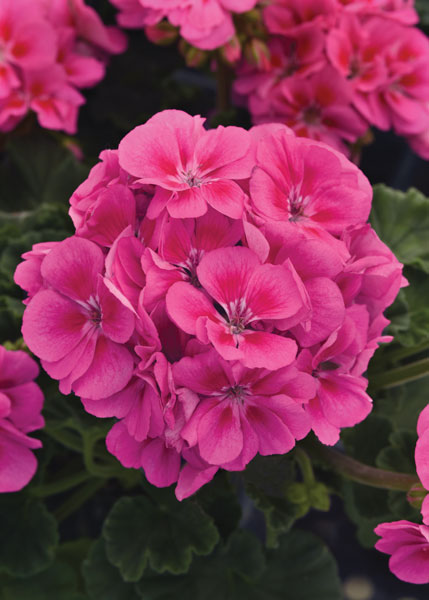6/1/2020
Ralstonia Found on Geraniums in Michigan
Chris Beytes

In April, USDA’s Animal and Plant Health Inspection Service (APHIS) confirmed the detection of Ralstonia solanacearum race 3 biovar 2 in the geranium cultivar Fantasia Pink Flare in a Michigan greenhouse. The plant that tested positive was shipped from breeder Ball FloraPlant’s geranium farm in Guatemala. APHIS has been working closely with them and distributor Ball Seed to take immediate action to contain and eradicate the disease.
To learn more about the situation, GrowerTalks spoke with Ball FloraPlant President Mike Klopmeyer. Back in 2003-2004, Mike was instrumental in working with APHIS and all the other geranium breeding companies to develop the strict Ralstonia prevention protocols that are in place today.
Mike said the Michigan operation in question received a total of 22,800 callused cuttings of Fantasia Pink Flare over a five-week period this winter. Once rooted and growing, about 400 of them, shipped in either Week 6 or Week 7, began to exhibit bacterial wilt symptoms.
Once tests revealed the cause to be the r3b2 strain of Ralstonia, Ball FloraPlant immediately notified APHIS and made the decision to destroy every Pink Flare shipped thus far—288,000 cuttings shipped to 288 greenhouses in the U.S. and 55 in Canada—whether or not they showed any symptoms. In addition, Ball FloraPlant and APHIS are asking those operations to dispose of any plants growing next to or under their Pink Flare plants, just in case they were exposed to the bacterium.
“Cut deep, cut hard” is how Mike described the effort to present any risk of disease spread. And thus far, only another 50 or so plants in a “handful” of operations have shown any symptoms.
“Our focus is to support our affected customers as they work with APHIS-PPQ on eradication of infected geraniums and proper disposal,” Mike said. “In the coming weeks, we will focus on processes at our farm to be re-certified so we can resume shipping to the U.S. and Canada.”
Why are the Feds involved?
Normally, offshore-borne plant diseases are handled between the seller and the greenhouse, without USDA involvement. In this case, this particular strain of Ralstonia is on a USDA quarantine list because it can cause a wilt disease in several important agricultural crops, including potatoes, tomatoes, peppers and eggplant. If it became established here, it could wreak havoc with those food crops, which is why APHIS takes it so seriously.
This is the first confirmed case of Ralstonia r3b2 in a U.S. greenhouse since 2004. That was at the tail end of the first big outbreak of Ralstonia on geraniums, which came into Michigan on some Americana Dark Red geranium cuttings imported from Kenya. That eventually led to the temporary quarantine of more than 800 greenhouse operations. Unfortunately, at the time the industry didn’t have any protocols in place for dealing with Ralstonia. They do now, which is why Ball FloraPlant was able to move so quickly with the help of APHIS to clamp down on the outbreak before it could spread. GT